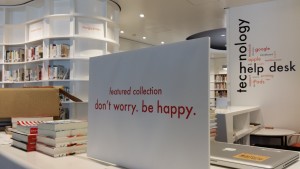When people say ‘the world is getting smaller’ they’re often talking about how well we seem to know each other; those 6-degrees of separation keeping us apart. Those close ties that we share are a very real entity, and a reason why I’ve always been very careful to never ‘burn bridges’ with people or assume that anyone I meet might have nothing to do with the people I already know. But that’s not what’s troubling me…
For a while now I have seen and sensed the ways in which things in our world are either shrinking or disappearing all together. This could be taken in a purely environmental context, but it’s not about extinction or endangerment. It’s the way our lifestyles at home are shrinking and disappearing. Small is in. Lack of physical objects is in. Partly driven by the digital behemoth of accessing information and entertainment anywhere, but also by a more subtle cultural shift to keeping ourselves literally mobile. If we can live and move with less, then it may make us more efficient. It might also increase serendipity as we link more services and spaces.
For example, I have a sizeable CD collection – years of listening to jazz and dance music, and others in-between have taken their toll on my shelves. I have rarely thrown or given away any of my CDs, as I do find myself coming back to them. Having a good CD player and stereo system helps. I have a library of MP3 songs for listening on the go, Digital Radio, and a Spotify account that I barely use. However I cannot convert myself to a purely digital collection. There’s something about sifting and sorting through those CDs to play – the quality of the sound (and yes I know there’s FLAC audio services too), the liner notes, the process all keep me entranced. Interestingly there was an article today about how vinyl is making a comeback. Yes, I have some vinyl too. And a lot of books. And a stack of DVDs and Blu-rays. And disc games.

The pattern here is our habit (and obsession) with ‘collecting’ – this is in contrast with the kinds of services, like Spotify, Kindle, Steam and Netflix, that offer all that choice without the hassle of ever having to store it somewhere physical. Likewise homes are becoming more compact in design, efficiency, and occupancy; small apartments and clever storage are quite appealing. The ‘collaborative consumption’ movement is also a sign of this shift – why waste space on things you use rarely? The more recent suggestion that the motor vehicle might go the same way (Elon Musk suggesting cars will be an on-demand commodity) are further signs of the ways our personal physical spaces no longer need to be as generous as they have been. As much as it will hurt me personally to one day give up my collections (because why will my kids even want that stuff?) there’s clearly going to more ‘space’ available in the near future… At least notwithstanding the massive global population, the need for screens, the lack of resources, the computing power of the cloud, and costs of all those subscriptions to new ‘mobile’ services. Alternatively, it justifies the power of libraries as one of the only places where physical collections might live.
Recently I saw the movie ‘Lucy‘ which explores the potential of a greatly expanded use of our brains; eventually resulting in the final lines of the movie “I am everywhere” when Scarlett Johansson achieves a kind of singularity at 100% brain power. It reminded me again of the shift away from the physical realms of our world and all the trappings of our wares. This is not about what’s cool, although that’s how we end up with it, it’s about us giving up our own space in order to supersede it with a more efficient solution. I wonder what education would do to make the physical redundant? MOOCs (Massive Open Online Courses) haven’t been the revolution many thought, and the staple of classrooms, storerooms, and computers labs are rarely challenged.
‘Save the Earth. Make the physical redundant’ – it would make a powerful provocation to kick thinking off on what else we might save space on. Like how I once opened a workshop for some teachers with a quote from Lu Hanessian: “Unpack your baggage so your kids don’t have to carry it.” With the above thoughts, that quote starts to take on a whole new meaning.
